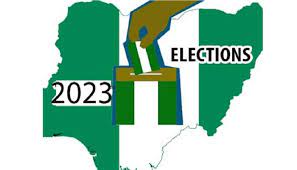*blame politicians’ desperation for crises
By Chesa Chesa
The intense power struggle ahead of the 2023 elections has the potential to accentuate the conflict trends, with Nigerian security agencies’ poor response to emergencies and distress calls posing a huge challenge.
This position was reached in a study conducted by development experts at Nextier, a leading policy think-tank.
They assert that with the elite desperation to capture power in the 2023 elections, there is widespread apprehension that violent cases, including assassinations, might escalate.
Besides, members of state security agencies are too few, not strategically deployed, overstretched, ill-equipped and corrupt to effectively manage ubiquitous terrorism, banditry, secessionist agitations, ritual murders, cultism, kidnapping and other forms of violent insecurity.
The report was authored by Dr. Iro Aghedo, an Associate Consultant at Nextier SPD and a Senior Lecturer, Department of Political Science, University of Benin, Edo State, Nigeria; as well as Dr. Ndu Nwokolo, a Managing Partner and Chief Executive at Nextier SPD and an Honorary Fellow, School of Government and Society, University of Birmingham, United Kingdom.
“There is a need for a system that monitors at-risk locations and assesses the probability of violence eruption, escalation, continuation and geographic diffusion”, said the researchers who stressed that atrocious violence in Nigeria has surged exponentially, as manifested by the rising trends in massacres, arsons and kidnappings.
The report disclosed that data from the Nextier Violent Conflict Database shows that between June 2020 and April 2022, at least 8,455 persons were gruesomely murdered.
“A yearly breakdown shows that 1,494 were killed in the second half of 2020, 4,379 in 2021, and 2,582 from January to April 2022. Among the 2,582 persons killed between January and April 2022, 2,424 were civilians and 158 security officers.
“In another report, a significant indicator of atrocious mass violence is the upsurge in cases of abductions which rose from 2,002 in 2020 to 5,663 in 2021. As evident from the rising trends of violence, extant mitigation strategies have not been effective”, the report noted.
To address this challenge and ensure prompt security of lives and investments, the report recommended there is a need to embrace the Early Warning and Early Response (EWER) mechanisms of providing adequate government presence in vulnerable communities, building trust between communities and security agents, as well as fostering closer collaboration with local actors.
Besides, building trust between local communities and the security agents was identified as a pathway to achieving lasting peace in Nigeria.
“Currently, there is minimal trust between most Nigerian citizens and the security agents, particularly the police. Many Nigerians, especially those living in rural communities, perceive state security agents as ‘predators’ rather than ‘protectors’”, the report said.
It further averred that this perception may not be unconnected with the ignoble culture of brutality, human rights violations, and extra-judicial killings that characterise Nigerian security establishments.
The researchers suggested the following approaches to ensure effective collaboration between communities, security agencies and the government.
Ensuring government presence in local communities: Most rural communities in Nigeria where rebel groups proliferate lack the most basic government presence. “Some do not even have accessible roads, electricity, and mobile telephone services” (Personal communication).
The non-availability of these essential infrastructures makes such communities vulnerable to attacks. This is because the people living in the areas find it challenging to make distress calls to security forces. Sometimes, even when security agents are eventually contacted, they find it difficult to access the communities because of bad roads or lack of bridges.
With such pervasive structural violence in these communities, other forms of violence quickly emerge, leading to more conflicts and violence (Nwokolo, 2017). Thus, the government and its development partners should ensure that all Nigerian communities have access to roads, even if they are just earth roads.
Fostering closer engagement between local actors and government. In Nigeria, most conflicts are grassroots-based. Even those which later spread to urban areas, such as the Boko Haram insurgency, usually erupt and emerge from rural settings.
As a result, the engagement between government agencies and community-based organisations such as faith groups, traditional institutions, and other civil society organisations needs to be strengthened to ensure the effective sharing of information and support.
A starting point for this in areas where there are telephone services is the sharing of phone numbers of Divisional Police Officers, Divisional Crime Officers, military commandants in the state, and local government chairpersons with regional actors such as traditional rulers, pastors, imams, and other relevant persons for quick communication in emergencies.
Need for sensitivity to conflict indicators: Violent conflicts hardly emerge from the blue. They often start in the form of crisis and build up to escalation if the grievances fueling them are unaddressed.
As part of EWER, government and community leaders need to be trained to identify and nip conflict situations before escalating. Government should work with security firms to execute such training. The money expended on such contracts is negligible compared to the losses of lives and investments that often accompany violent conflicts.



